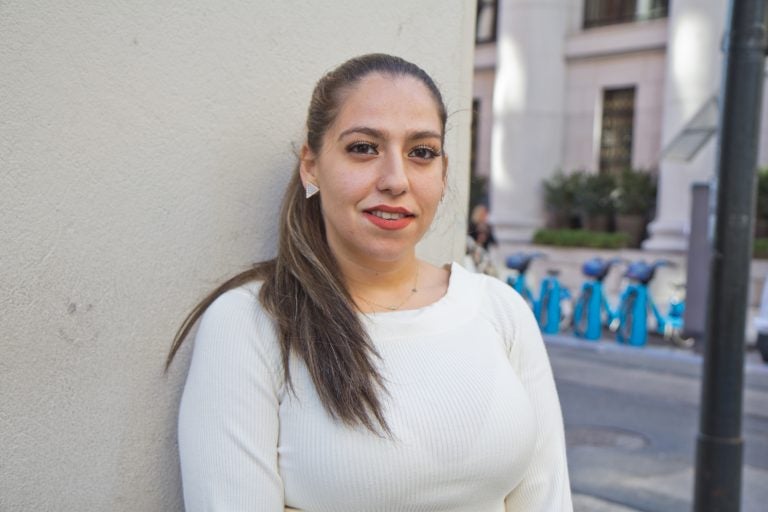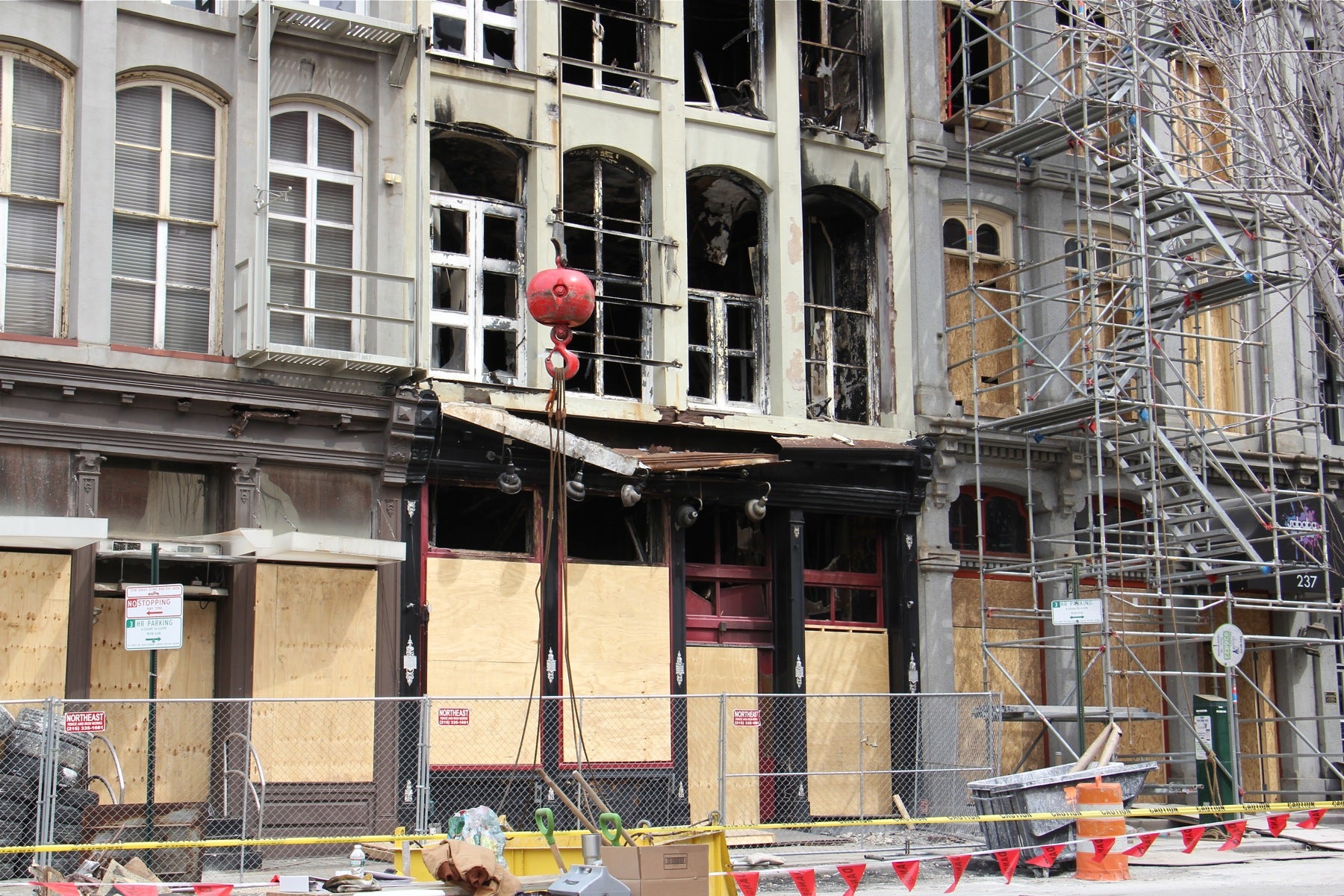Brothers indicted in Old City arson stole wages, lawsuit alleges
Years before federal authorities charged Imad and Bahaa Dawara with torching their Old City business, former employees say the pair stole their wages.

Amal Ibrahim, a bartender, has joined a class action law suit alleging brothers Imad Dawara and Bahaa Dawara defrauded employees out of hundreds of thousands of dollars in wages. The brothers have been charged with arson in connection with the 2018 fire that burned the 200 block of Chestnut Street. (Kimberly Paynter/WHYY)
Years before brothers Imad and Bahaa Dawara were indicted on charges they torched their Old City business to collect an insurance payout, former employees say the pair were well versed in other types of illegal activity.
Namely, wage theft and tax fraud.
In 2015, the Dawaras were just another pair of nightclub owners in a neighborhood full of lounges and bars. Then-21-year-old Amal Ibrahim was referred to the two men by a family friend, who told her they could get her work behind the counter at B-Side Hookah Lounge, a nightlife spot the brothers then owned in the building on Chestnut Street that would later catch fire.
The brothers offered Ibrahim a job with an unusual — and illegal — starting wage: zero dollars an hour. All her earnings would come from tips.
Although Ibrahim would learn that working just for tips is a violation of labor law, the New Jersey woman says she was too young and eager for a job to know better.
Ibrahim told herself she’d make enough from tips to get by and started work.
“We were all 21 or 22 years old,” she said. “I needed to work.”
Ibrahim began working long bar shifts with no breaks. But the Pennsauken resident said barely five months had passed before she realized something was very wrong. A letter arrived in the mail, a 1099 tax form from the Internal Revenue Service. The IRS document stated that the Dawara brothers had reported paying her about $21,000 in wages as a contractor.
Ibrahim was stunned. Not only because of the phantom income, but because the IRS now expected her to pay thousands in taxes on wages she’d never received.
When she and other employees confronted the brothers, they were told that it was all a misunderstanding.
“They said I was crazy, that I didn’t know what I was talking about. They said they’d take care of it,” Ibrahim said. “He led me on. I gave him the benefit of the doubt.”

Ibrahim said the brothers became harder to reach in person or on the phone and within three months, scheduled her out of the bar altogether.
She moved on, but says the Dawara brothers never resolved the issue. In 2017, the IRS sent a notice saying that she still owed taxes on the wages the brothers had reported as her earnings. Soon after, Ibrahim described the saga to a friend who told her that the entire arrangement was illegal and introduced to Ryan Hancock, a labor attorney at Willig, Williams & Davidson, a Philadelphia firm.
Together, Hanock and Ibrahim tracked down two other former Dawara employees who said they had been subjected to the same unlawful practice. The lawyer filed a class-action lawsuit against the brothers in February 2018.
“Businesses try to move individuals off their books to avoid paying wages and benefits. They say they’re not employees, they’re ‘independent contractors,’” Hancock said. “This is one of the most ludicrous examples of that I’ve ever seen. I’ve never heard of a bartender or server being called an independent contractor.”
An attorney for the Dawara brothers did not return a request for comment.
Wage theft, then a fire
The suspect tax practices may have been an eerie portent of the financial mismanagement that federal authorities now say motivated the brothers to use gasoline to set fire to their former business in hopes of collecting a $750,000 insurance premium.
The resulting fire, in April 2018, destroyed a historic building, creating a vacant lot on the 200 block of Chestnut Street. Hundreds of nearby residents were displaced, and a typically busy block was closed for months as debris was removed, causing adjacent businesses to shutter.

When Ibrahim saw news reports about the block in Old City going up in flames, she thought about the paperwork likely engulfed in the blaze.
The fire destroyed any documents that could be used as evidence in the class-action suit filed less than two months earlier.
“It was weird because the fire was right around the time I was contacting him saying I’d got a lawyer,” Ibrahim said. “I didn’t know about the insurance at the time, so I was like ‘Hey, did they set the place on fire so there wouldn’t be any records that had me there?”
‘I can’t buy a home’
A judgment on the wage theft was entered against the brothers earlier this year, but the lawsuit is still pending. Hancock worries their ability to ever pay out damages could be jeopardized by their indictment. And he fears the Dawaras may have defrauded other employees during their long stint in the nightlife business.
“There were lots of low-wage workers who lost a lot because of these brothers’ behavior,” Hancock said.
Today, Ibrahim is 25 years old and works at another Center City bar while enrolled in nursing school. She says she wants to move on with her life.
“The IRS is still sending me notices and penalties. I can’t buy a home. I can’t get a loan for nursing school,” Ibrahim said. “It’s a big weight. I’m just trying to fix it.”
WHYY is your source for fact-based, in-depth journalism and information. As a nonprofit organization, we rely on financial support from readers like you. Please give today.





